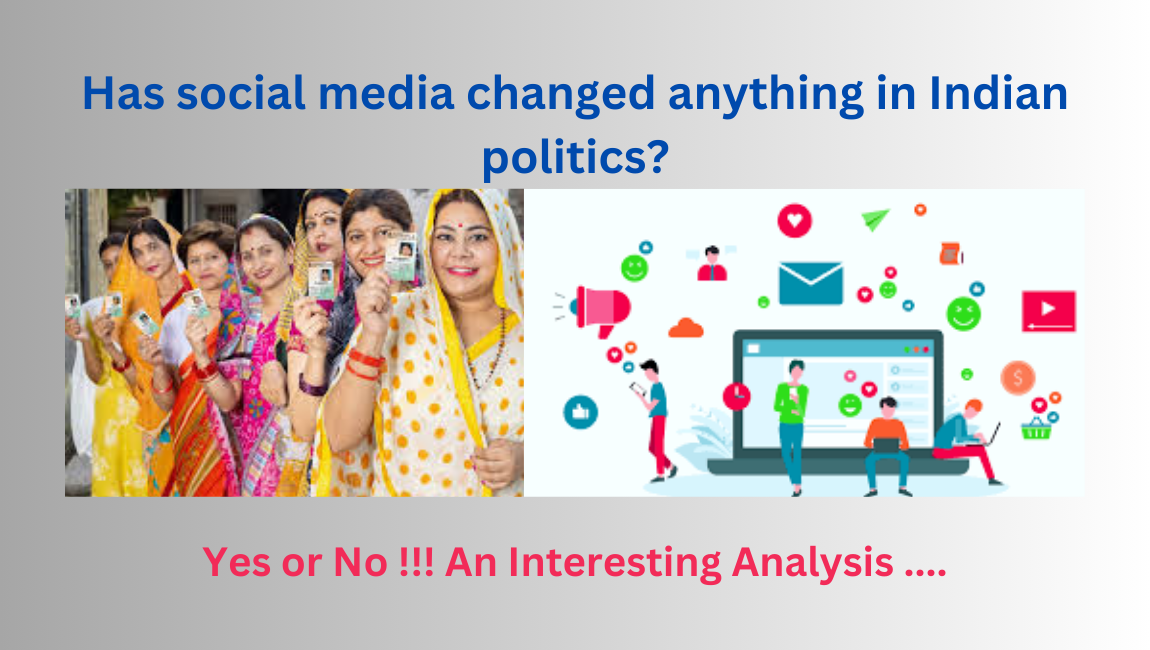Political Review : Has social media changed anything in Indian politics?
Social media has significantly transformed Indian politics in numerous ways, reshaping how political campaigns are conducted, how politicians interact with the public, and how public opinion is formed and influenced. Here’s a detailed analysis of the impact of social media on Indian politics:
1. Direct Communication with the Public
- Politicians’ Outreach: Social media platforms like Twitter, Facebook, Instagram and others have allowed Indian politicians to communicate directly with the public. Leaders like Narendra Modi, Rahul Gandhi, and Arvind Kejriwal and more other national, regional political parties actively use social media to share their views, campaign messages, and updates, bypassing traditional media channels.
- Transparency and Accessibility: This direct line of communication has made politicians more accessible to the public. Citizens can now engage with their leaders, express concerns, and receive responses more quickly than ever before.
2. Political Campaigning and Mobilization
- Digital Campaigns: Social media has become a crucial tool for political campaigning. Parties invest heavily in digital campaigns to reach voters, particularly the youth. The use of targeted advertisements, viral hashtags, and social media influencers has become common practice.
- Voter Mobilization: Social media platforms have been instrumental in mobilizing voters, especially during elections. Campaigns like “Bharat Jodo” nad “Haath Badlega Haalat” By INC, “Sabka Saath Sabka Vikas”, “Chowkidar” by the BJP, “Main Bhi Neta” by the AAP and other public attractive slogans were widely propagated on social media, creating a strong narrative and engaging voters.
3. Public Opinion and Narrative Building
- Shaping Public Opinion: Social media plays a vital role in shaping public opinion. The rapid spread of information, memes, and videos can influence how people perceive political events, policies, and leaders. This has made social media a battleground for narrative control.
- Echo Chambers: Social media algorithms often create echo chambers, where users are exposed mainly to information that aligns with their existing beliefs. This can polarize public opinion, leading to a more divided political landscape.
4. Political Activism and Grassroots Movements
- Grassroots Movements: Social media has empowered grassroots movements and allowed them to gain traction quickly. Movements like the Anna Hazare-led anti-corruption movement, the 2012 Delhi / Kolkata gang-rape protests, and the recent farmers’ protests gained momentum through social media platforms.
- Citizen Journalism: Social media has turned ordinary citizens into journalists, enabling them to report on political events, protests, and issues that may not receive adequate coverage in mainstream media. This has increased accountability and transparency in Indian politics.
5. Misinformation and Fake News
- Spread of Misinformation: The rapid spread of misinformation and fake news on social media is a significant concern in Indian politics. False information can be used to manipulate public opinion, defame opponents, or create communal tensions. The 2019, 2024 general elections, for instance, saw widespread use of fake news and doctored videos.
- Fact-Checking Initiatives: In response to the spread of misinformation, various fact-checking organizations and initiatives have emerged. However, combating fake news remains a significant challenge.
6. Youth Engagement and Political Participation
- Youth Mobilization: Social media has become a powerful tool for engaging the youth in politics. With a large portion of India’s population being under 30, social media provides a platform for young people to voice their opinions, organize protests, and participate in political discourse.
- Political Awareness: Platforms like YouTube and Twitter have also become sources of political education, where young voters can learn about candidates, policies, and issues, leading to more informed voting decisions.
7. Real-Time Feedback and Policy Formulation
- Instant Feedback: Social media provides politicians with real-time feedback on their policies, speeches, and actions. This immediate response allows politicians to gauge public sentiment and adjust their strategies accordingly.
- Crowdsourcing Ideas: Some politicians and parties have used social media to crowdsource ideas for policies and initiatives. This has led to more participatory governance, where citizens can contribute to decision-making processes.
8. Challenges and Ethical Concerns
- Data Privacy: The use of personal data for targeted political advertising raises concerns about privacy and the ethical use of data. The Cambridge Analytica scandal highlighted how data from social media platforms can be misused in elections.
- Regulation and Oversight: The unregulated nature of social media has led to calls for stricter regulations to prevent misuse in politics. However, balancing regulation with free speech remains a complex issue.
Review
Social media has undeniably changed the landscape of Indian politics, making it more dynamic, interactive, and, at times, contentious. While it has democratized political communication and increased engagement, it has also brought challenges such as misinformation, polarization, and ethical dilemmas. As social media continues to evolve, its role in Indian politics will likely become even more significant, necessitating ongoing adaptation by political actors and the public alike.

